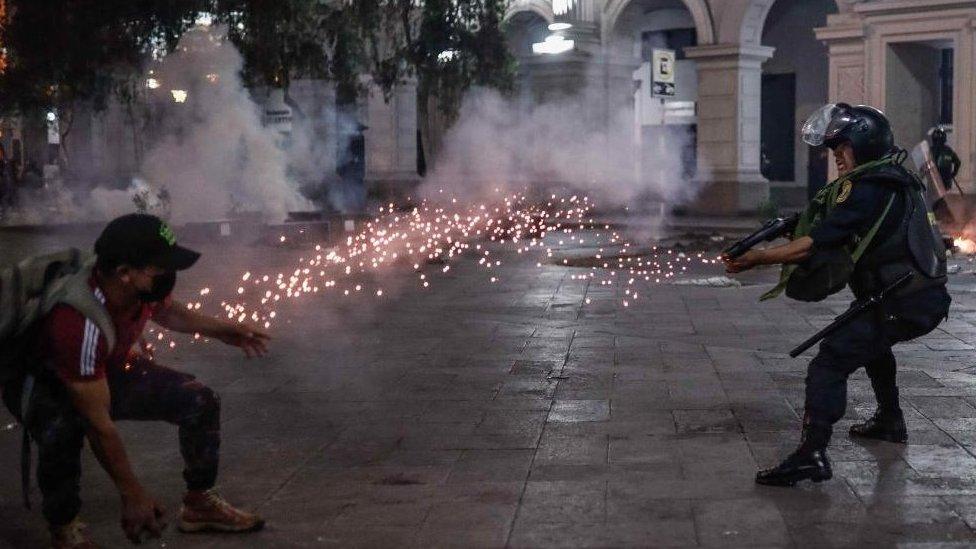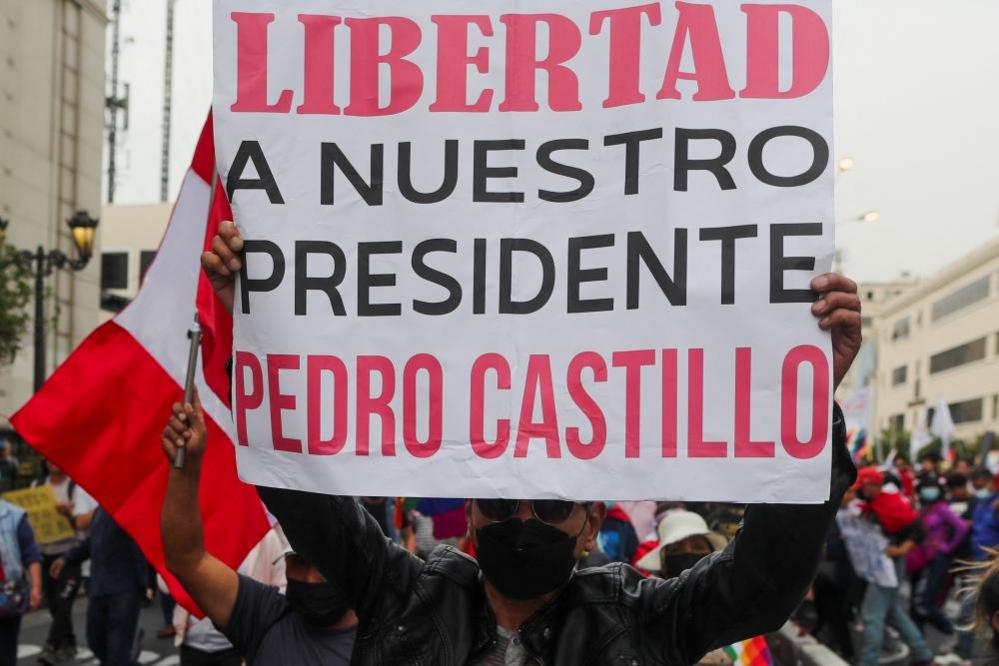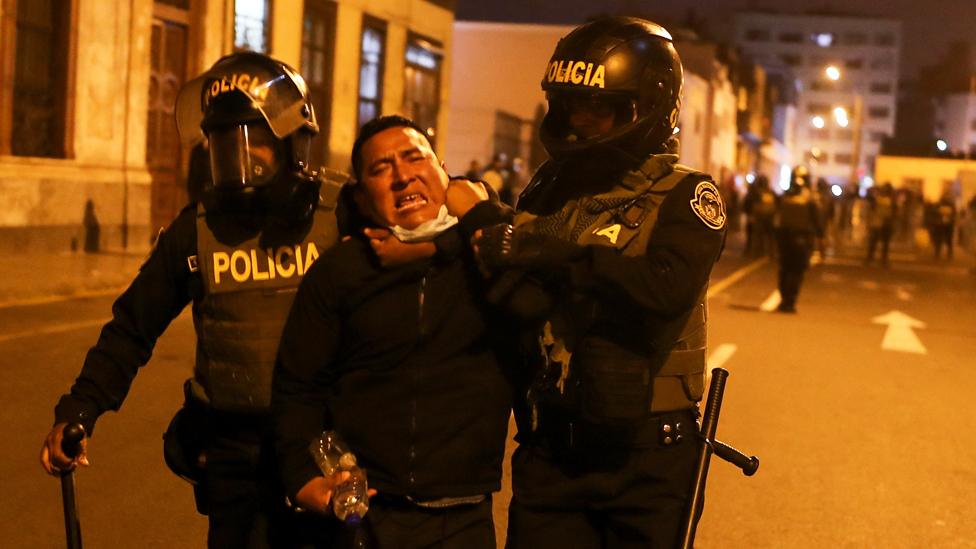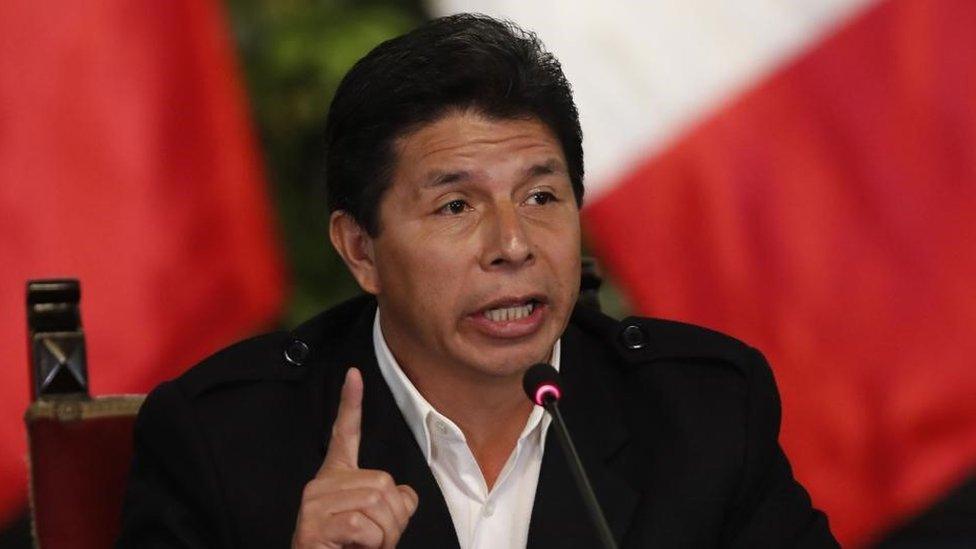Peru's new leader proposes early election amid protests
- Published

Two teenagers were killed and a number of police and protesters injured in clashes
Peru's new president, Dina Boluarte, is proposing bringing general elections forward by two years to April 2024 amid continuing political tension.
She also declared a state of emergency in areas where protests have erupted.
Protesters are demanding fresh elections after Ms Boluarte's predecessor, Pedro Castillo, was impeached following his attempt to dissolve Congress.
Mr Castillo called Ms Boluarte's plans to move the elections a "dirty game".
In a handwritten letter that he tweeted on Monday, he called Ms Boluarte a "usurper", and said he had been "kidnapped" and humiliated.
In a televised address to the nation early on Monday local time, Ms Boluarte said she would submit a bill to Congress to hold elections in April 2024 instead of April 2026.
The move represents an about-turn. Ms Boluarte, who was sworn in as president on Wednesday, said on taking office that she would serve out the remainder of Mr Castillo's five-year term in office in full.
But protests, some of which turned violent, in the regions of Apurímac, Arequipa and Ica by people demanding fresh elections increased the pressure on Ms Boluarte.
Two teenagers were killed in clashes between demonstrators and police in the south-western Apurímac region.
Andahuaylas airport in Apurímac had to be closed as protesters and police clashed and smoke could be seen billowing from its buildings.
In her address, Ms Boluarte said that she would also propose a series of constitutional reforms to achieve "a more efficient, transparent and participatory system of government", but did not go into detail about what those reforms would be.
"I call on all the parties and the Peruvian people to take part in this process so that we're guided by a wave of democratic feeling," she said.
Peru was thrown into political crisis last week when then-President Pedro Castillo took to national TV to announce the dissolution of the opposition-controlled Congress just hours before the legislative body was due to vote on his impeachment.
Watch: Three dramatic moments from the day Peru's president was ousted
Congress met in defiance of Mr Castillo and voted overwhelmingly to impeach him.
Within hours, Dina Boluarte - who until then had been Mr Castillo's vice-president - was sworn in as Peru's new leader.
But while Mr Castillo's approval ratings had been very low, those of Congress have been even lower and thousands of Peruvians have taken to the streets to demand general elections be held as soon as possible.
Many of those protesting are also demanding the release of Mr Castillo, who is in police custody.

Some protesters held up banners demanding "Freedom for our President Pedro Castillo"
He was stopped by his own bodyguards from making his way to the Mexican embassy, where he was going to ask for political asylum.
Mexico's Foreign Minister, Marcelo Ebrard, said on Thursday that officials "had started consultations with Peruvian authorities" over Mr Castillo's asylum request.
But shortly afterwards, Mexico's ambassador in Lima was summoned and warned by Peruvian officials that they considered Mr Ebrard's comments an interference in the country's internal affairs.
A court ordered last week that Mr Castillo be held in preliminary detention for seven days while an investigation is carried out into whether he should be charged with rebellion.
His supporters have called for a strike on Monday and are planning to block key roads.
How Ms Boluarte deals with the protests is seen as a key test for her presidency and whether she will be able to hold on to power until April 2024.
Peru's politics have suffered from instability for years, with the legislative and the executive almost constantly at loggerheads.
Ms Boluarte is the sixth president to hold power in as many years.
The last president to serve a full five-year term was Ollanta Humala, who governed from 2011 to 2016.
Related topics
- Published12 December 2022

- Published8 December 2022
